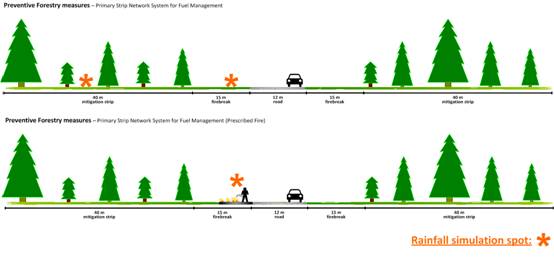Small-scale monitoring/experimentation
A programme of small-scale experiments with different vegetation covers and fire severities to test the effects of burning different types and quantities of litter on soil characteristics will be undertaken. These experiments will be carried out in the grounds of ESAC, Coimbra, Portugal, using a series of specifically designed lysimeters. This set of experiments will be started during late 2009 - early 2010. The experiments will continue throughout year 4 of the project. The lysimeters will provide information on fire type and intensity on soil hydrological properties for several types of soils, slope angles, stoniness, organic matter contents, etc. The lysimeters are being designed to test different intensities and temperatures of fires for a wide range of soils and slope angles, under controlled conditions. Soil moisture and temperature probes will be used to acquire data on the burning characteristics, and the lysimeters will be designed such that they can act as small plots on which it will be possible to perform rainfall simulations.
According to the results obtained in the second stakeholders workshop (WB3) the technology to be implemented, in Mação Municipality (Site 1), was Preventive Forestry. The monitoring procedure(s) to be adopted for this management type is/are not well formulated at present, but if suitable sites can be identified, the mitigation benefits/damage will be assessed. This will be carried out in years 4-5 of DESIRE. Preventive forestry covers a wide range of technologies, including terracing, the use of fire resistant species, understorey management, tree-to-tree distance, Primary Strip Network System for Fuel Management, Prescribed Fire, etc. The implementation of the Primary Strip Network System for Fuel Management is currently being developed by the Municipal Civil Protection of Mação (forest fire first intervention teams).

This is a technology intended to halt/limit the progress of wildfire across the landscape. In some cases, firebreaks in central Portugal are made by bulldozing the vegetation and leaving the soil bare. This is potentially a highly degradational procedure, which will be monitored. During the maintenance phase, firebreaks on the Primary Strip Network System for Fuel Management can also be done using prescribed fire. Rainfall simulations will be carried out on the firebreak and on the mitigation strip during the dry and wet seasons. The precise number will depend on what is feasible.